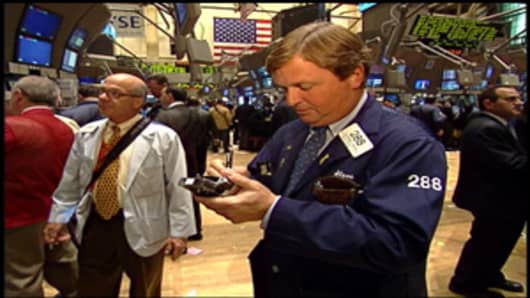Investors who spent the past nine months avoiding the skidding US stock market and economy by snapping up multinational companies are now coming back home.
As stocks have staged a comeback and the economy is showing that it is in for at most a mild recession, portfolio managers have been in rebalancing mode to bring their national/international investment ratios back to a more normal level.
It's not that there's any great fear over international firms, but rather a growing confidence that most of the bad stuff is over for domestic companies and there should be reason to grow.
"The large multinationals that benefited from a falling dollar really ruled the roost for the last 18 months or so. I think that's changing," says David Twibell, president of wealth management for Colorado Capital Bank in Denver. "Some of that money is going to start filtering into other areas of the market."
Twibell sees opportunity in a number of beaten-down sectors in the US stock market, with small-and mid-cap companies becoming particularly attractive.
"I think they're cheap in this market. They generally benefit coming out of a low-growth cycle," Twibell says. "We're either at the midpoint or towards the latter end of this economic slowdown. I don't think we're going to have exceptional growth out of it, but I think we're going to see the economy pick up by the end of the year."
Among the areas to benefit, according to Twibell: Community and regional banks, as well as domestic water companies, which he believes will perform well as demand continues to increase overseas.
Regional bank leaders include State Street, US Bancorp and UnionBanCal .
Leading water companies are American Water Works and Aqua America.
The ability to do business overseas, in fact, continues to be a priority, though just not as much as when stocks were tanking.
Checking Business Overseas
Michael Kresh, president of M.D. Kresh Financial Services in Islandia, NY, takes a bit more nuanced view of the national/international rebalancing that entails re-examining how much companies in an investor's portfolio are doing business overseas, even though they are US-based.
As an example, he cited CNBC.com-parent General Electric .
GE reported first-quarter earnings that fell far below Wall Street's expectations, yet would have been worse had the company not done as well in its international businesses. Holding too many companies like GE could tilt a portfolio too much to the international side, a globalization phenomenon attracting Kresh's attention as he reviews his client's investment needs.
"I have to look at my positions that are globally based," he says. "My weighting internationally is more than I thought."
As an adviser who handles relatively older clients, Kresh likes to play emerging markets, but is taking a bit of a different strategy as new trends unfold.
"My clients are so close to retirement that direct exposure to emerging markets creates the volatility that makes people uncomfortable," he says. "I still like emerging markets, but what we try to do is look at multinational and larger companes that have emerging market plays rather than companies that are directly emerging markets related. I'd rather invest in a fund that has Asian companies that do business in China rather than buying China directly."
Kresh also is watching the dollar for clues as to how much he wants to weigh towards international companies.
"That's going to change this whole picture," he says. "If the dollar strengthens a lot, which I hope it does, then our multinational companies will go down."
Oil Volatility Leads to Caution
Oil will be a wildcard as its price hits new highs every day. A continued surge in oil could cause weakness in US-based companies whose profits are eroded by rising fuel costs.
"I don't know that you can just buy across the board, but if we do come out of this with a mild recession, I think a lot of the areas are going to look pretty good," Twibell says. "I don't know how selective you're going to have to be. The real kicker could be oil."
But Julie Murphy Casserly, president of JMC Wealth Management in Chicago, says projections she has seen from the major brokerages indicates strong domestic stock growth in the next three years.
"I just think it's going to go back to a more normal range," she says. "We're now looking at more normal rates of diversification."
Yet some remain cautious.
"I'm still advising people to be a little defensive," says Matthew Tuttle, president of Tuttle Wealth Management. "I'm a little worried about whether we're going to see a correction in oil prices. We're advising people to play strong defense and let's wait to get some clarity about what's going on in this economy."



